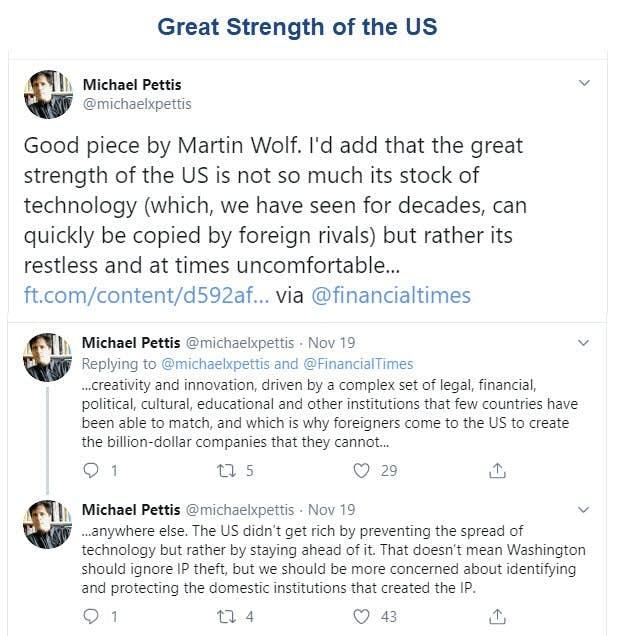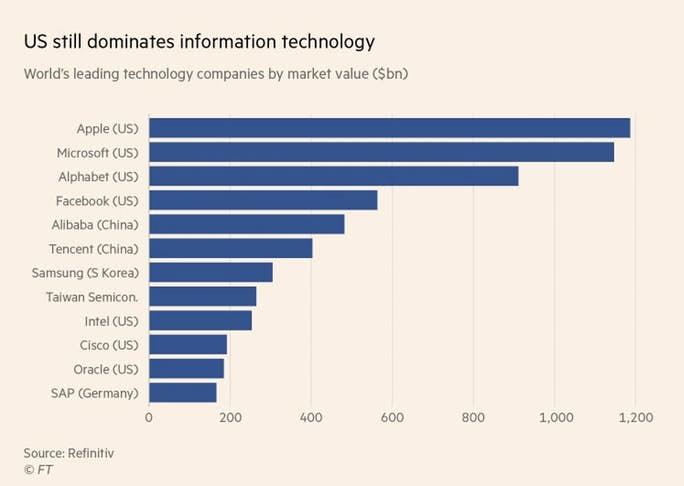Trump’s Impossible Fight To Stop Theft Of Ideas
Authored by Mike Shedlock via MishTalk,
Trump is on a mission to stop China from stealing US IP. It’s not possible, but what if it was?
Assume we could stop 100% of IP theft by “free riders” who improve the product and pass it off as their own.
Would we want to?
Nicholas Gruen, CEO of Lateral Economics, says We’re All Free Riders. Get over It!
The free rider problem is real enough. If it costs vast sums to test a new drug, we can’t expect the market to do so if all that investment can be undercut by imitators. But here’s the thing. In addition to the free rider problem, which we should solve as best we can, there’s a free rider opportunity.
The American economist Robert Solow demonstrated in the 1950s that nearly all of the productivity growth in history – particularly our rise from subsistence to affluence since the industrial revolution – was a result not of increasing capital investment, but of people finding better ways of working and playing, and then being copied.
If, as a society today, we had to choose between addressing the free rider problem and seizing the free rider opportunity, taking the latter option wins hands down.
Free Rider Problem
Gruen quotes Thomas Jefferson:
“Ideas should freely spread from one to another over the globe, for the moral and mutual instruction of man, and improvement of his condition.”
One can solve the free rider “problem” with paywalls and tight controls but tight controls also limits the number of buyers.
Gruen notes that Google generates many hundreds of billions of dollars every year but monetizes only a small fraction of that value. But $60 billion per annum is enough to make its founders rich beyond their wildest dreams.
German Firms Abandon China, US Firms Should Do the Same
A few days ago, I penned German Firms Abandon China, US Firms Should Do the Same.
The headline does not precisely match the sentiment I expressed inside. Here is my key point:
Tariffs Will Not Fix the Problem
If anything, tariffs made matters worse. And don’t expect a trade deal in pieces to do anything about IP theft either.
What to Do?
For well over a year, a friend kept asking, what would you do about it?
My answer was then and remains now “nothing”. This is not a matter for Trump to solve. Businesses need to decide for themselves whether or not it is worth it to do business in China.
That’s the key. This is not a problem Trump can solve. If businesses feel they are losing money doing business in China, they have a choice: They can decide they are making enough money anyway and it’s all worth it, or they can leave.
My headline title “German Firms Abandon China, US Firms Should Do the Same” caters to those who believe they are not making enough money or the risk isn’t worth it.
If enough companies leave, China will change its ways.
Here’s another view.
Chinese IP ‘Theft’ Doesn’t Justify Trump’s Tariffs
Donald Boudreaux, professor of economics and Getchell Chair at George Mason University in Fairfax, Va. makes the case Chinese IP ‘Theft’ Doesn’t Justify Trump’s Tariffs
Much of this “theft” is in fact in-kind taxation. Beijing requires that certain foreign companies seeking to do business in China share their intellectual property with the Chinese. Companies that attach a high value to the opportunity to do business in that large country often agree to these terms. But IP belonging to companies that are willing to forego the opportunity to operate in China is not stolen or otherwise acquired by the Chinese.
This in-kind tax is unfortunate. But IP acquired through it no more counts as stolen property than does cash paid in taxes to Beijing (or, for that matter, to Uncle Sam) count as stolen property.
Like all taxes, Beijing’s requirement of IP sharing discourages foreign companies from doing business in China. And so by making China a less-attractive place to invest, this in-kind tax reduces China’s rate of capital accumulation. In turn, worker productivity there grows more slowly, as does the Chinese economy as a whole.
In short, the chief victims of this tax are the people of China.
Second, Uncle Sam’s taxes imposed on Americans who buy imports from China is a poor remedy for China’s IP violations. The direct harm that these tariffs inflict on us Americans might be a price worth paying if they offered the best hope of persuading the Chinese to treat our IP with greater respect. But they don’t.
Fight to Halt the Theft of Ideas is Hopeless
Martin Wolf at the Financial Times writes the Fight to Halt the Theft of Ideas is Hopeless
I believe this is the first time in history I have ever agreed with a major point of Wolf.
His opening gambit is perfect “China will not accept inferiority and the west should not want it to.”
That is the correct answer to the question I posed at the top of this article.
Wolf provides a history lesson on “free riders” noting that in the 18th century England criminalised the export of textile machinery to the US. Technology managed to make it to the US anyway.
Technology transfer was unstoppable then and it is unstoppable now. And then it was the US “stealing” technology.
Here is Wolf’s key point in one short paragraph:
“China will not accept permanent inferiority. We should not want it to be permanently inferior either. We should instead want the energies of the Chinese people to build on our ideas. That is how progress occurs.”
I agree 100%.
Michael Pettis Chimes In
I found that FT article reference in a series of Tweets by Michael Pettis.
US Dominates in Global IP
The US has the top four IP spots globally and 7 of the top 12. Germany is the lone EU entry at spot 12.
Why is that?
Because as Pettis notes,
“The great strength of the US is its restless and at times uncomfortable creativity and innovation, driven by a complex set of legal, financial, political, cultural, educational and other institutions that few countries have been able to match, and which is why foreigners come to the US to create the billion-dollar companies that they cannot anywhere else. The US didn’t get rich by preventing the spread of technology but rather by staying ahead of it.”
And as I have pointed out many times, the US has the largest, most open capital markets in the world. Google, Apple, and Microsoft could not exist in the EU because the EU would bust them up in the name of competition.
Google thrives because it allows people free use of its search engine. People use it because they like it. Those who don’t like it are free to try something else. From its enormous search engine profits, Google started the entire new field of autonomous driving.
Autonomous driving competition is intense. That ensures further progress. Please note that Commercial Driverless Taxis Have Arrived.
Please Keep Elizabeth Warren Out
Elizabeth Warren would bust up all four of the leaders. So would the EU. For what?
Trump Seeks to Protect Companies From Themselves
Trump finds fault in all of this.
He wants to protect companies from themselves.
At one point he proposed not letting Apple do business in China. Sheeesh, if Apple thinks it can prosper in China, that should be Apple’s business business, not Trump’s.
Meanwhile, US farmers are suffering. Ironically, even US steel companies are suffering and steel companies were supposed to be the big beneficiary of his tariffs.
Industrial Production Dives and It’s Not All Strike Related
We are in a manufacturing recession co-sponsored by Trump. Note that Industrial Production Dives and It’s Not All Strike Related.
Also note that GDP Estimates Crash on Dismal Economic Reports
This isn’t all Trump’s fault, but some of it it.
Has Trump Inflicted Enough Pain Upon Himself Yet?
Trump’s tariffs are so wrong that it prompted me to ask on October 26: Has Trump Inflicted Enough Pain Upon Himself Yet?
Since Trump is still dickering with China over “part 1” of a trade deal, the unfortunate answer is “no, not yet”.
Tyler Durden
Fri, 11/22/2019 – 21:05![]()
Zero Hedge’s mission is to widen the scope of financial, economic and political information available to the professional investing public, to skeptically examine and, where necessary, attack the flaccid institution that financial journalism has become, to liberate oppressed knowledge, to provide analysis uninhibited by political constraint and to facilitate information’s unending quest for freedom. Visit https://www.zerohedge.com


